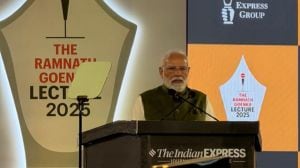Stay updated with the latest - Click here to follow us on Instagram
Interview: Maharashtra to emerge as electronic giant by 2030, says Fadnavis
Pushing reforms at high-speed is the next task, says Maharashtra CM Devendra Fadnavis
 Maharashtra Chief Minister Devendra Fadnavis campaigns for KDMC Municipal election Wednesday.(Express Photo by: Deepak Joshi)
Maharashtra Chief Minister Devendra Fadnavis campaigns for KDMC Municipal election Wednesday.(Express Photo by: Deepak Joshi)
Chief Minister Devendra Fadnavis believes ‘Make in India’ cannot be a reality without Make in Maharashtra. While acknowledging he has succeeded in a confidence building exercise, pushing reforms at hi-speed is the next task he says.
Q. How realistic is your claim on FDI after the six nation tour?
A. In just one year, we have crossed Rs 1 lakh crore investment and there is not a single MoU signed which had to be kept on back-burner.
My visit to America, China, Japan, Israel, Davos, Germany was to promote Make in Maharashtra and it has helped to restore the confidence of foreign investors in the most leading state of the country.
Whether it is Foxconn, General Motors, Microsoft et al are here for serious business with India. We have tapped investments through
collaborations in automobiles sector, infrastructure including roads, coastal and aviation and electronics.
Q. Questions have often been raised about realistic investments from Foxconn pronouncing $5 billion?
A. I have dealt with them and believe they are going to be the game changer. I visited their manufacturing unit in China which has
employed 5 lakh people. They reckon Maharashtra is the best destination for business because of skills and human resources, low
cost and labour. Moreover, my government is not dealing with soft gloves. We know our business and state and country’s welfare.
I am optimistic by 2030 we would emerge as indegenous manufacturer of electronic goods. Today, we spend Rs 7 to 8 lakh crore on crude oil import. We will see that kind of investment in electronics. We will emerge as exporter. We are good at software but totally rely on
hardware outside. Today, almost 93 per cent of the electronic products such as TV screens, mobilise phones are either imported in parts and assembled.
Q. What was the impact of the state IT policy?
A. It has generated Rs 4,500 crore investment and led to creation of 50,000 jobs. The decision to promote and develop IT township is
welcome as it opens up the concept of “walk to work” culture.
Q. Do you regret scrapping of Local Body Tax before enforcement of Goods and Services Tax?
A. The LBT would not have lasted anyway beyond April 2016. Moreover, in the wake of GST, we were all driven towards single tax regime. At present, we can say GST has been delayed. But I am hopeful it would be enforced by this year end. I believe it would get passed in winter session of parliament.
Q. Why has Maharashtra fared badly in World Bank’s ratings in ‘ease of doing business’?
A. I admit there were some reforms related to labour where we could have taken quick decisions. But otherwise we are all set to end the
permit raj system in state. Now, instead of 108 permissions, you would require just 15 to 20 to open a hotel. Or setting up new business
would not exceed more than 25 permissions. We are trying further integrate the system to make it a single-window system.
Q. And on roads and ports?
A. In the next four years, we will plan roads upgradation and city to town and village connectivity for which we have earmarked Rs 30,000 crore funds. Roads and ports development is also integral for boosting the urban and rural economy.
Q. Your comment on sustained negative growth in agriculture sector?
A. When 25,000 villages are reeling under drought for the last three years out of 40,000 it remains the biggest concern. Through “jalyukta
shivar” water conservation programmes, we intend to address the critical sector on war footing. In the next three years, we would have
completed 3.5 to 4 lakh projects with additional water capacity of 125 TMC. In would bring under irrigation between 24 to 30 lakh hectares of land. We have given impetus on higher yeild per acres/hectares. Unless, agro-sector is robust we cannot totally rely on industries for growth.
Q. Regional imbalance has often divided Maharashtra. What have you done?
A. We are committed to implementation of Kelkar Committee report which is under scrutinise by the sub-committee. Apart from that we have regionwise mooted projects. Take an example of textile hub in cotton belt of Amravati district in Vidarbha. We have set up eight textile parks. Or given nod for nine mining auctions in Chandrapur-Gadchiroli districts of Vidarbha to promote industries, investment and employment to locals. In Konkan, tourism is the mainstay. In Marathwada, we are rolling out industrial corridors along Aurangabad and adjoining towns.







